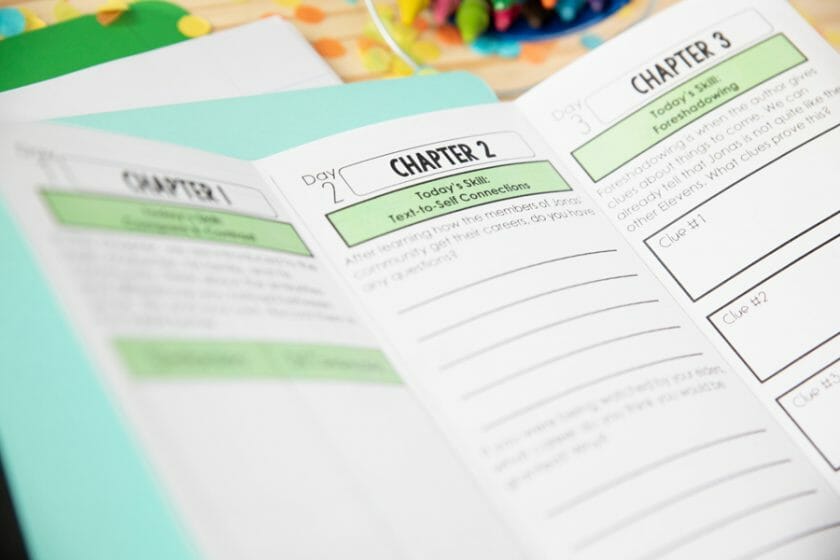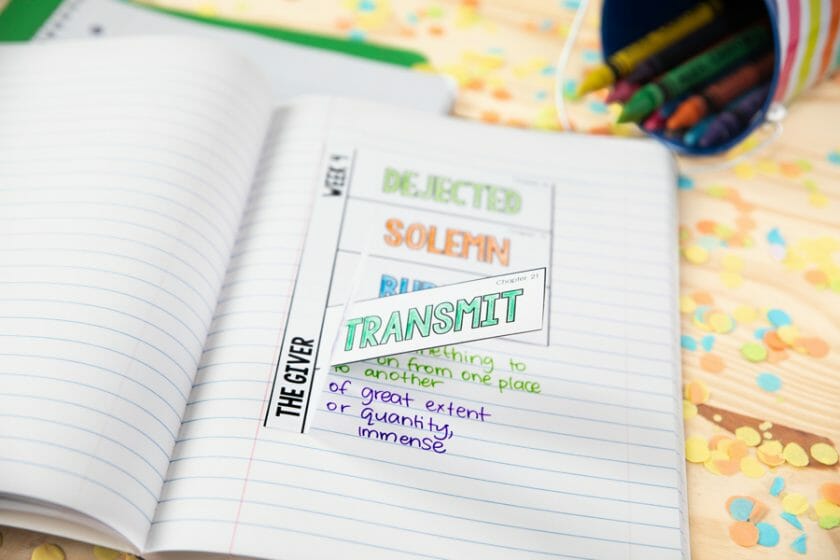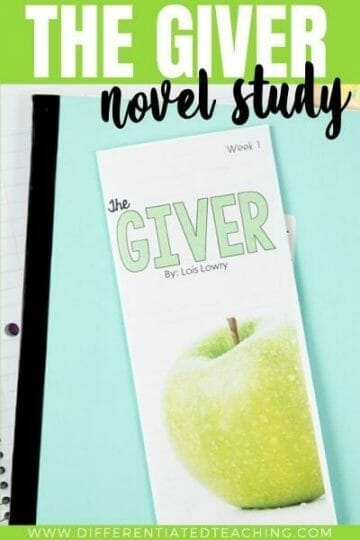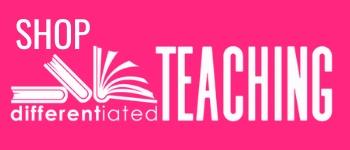The Giver Novel Study: Unlocking Lois Lowry’s Classic
Lois Lowry’s award-winning novel The Giver is an awesome book for getting kids thinking about social studies and society’s norms. Ideal as a book club or literature circle text for upper elementary and middle school, your students can enjoy the story as a whole-class novel study or read aloud.
This book is popular with upper elementary students because it captures their imagination about a world far from theirs. The Giver novel study is a great way to teach reading comprehension and vocabulary as you enjoy the story.

The Giver Novel Summary
If you’re unfamiliar, the story centers around Jonas, an 11-year-old boy who lives in a futuristic society that has eliminated hunger, war, and suffering. Everything in Jonas’ world is controlled by “the Elders”, and as he approaches his 12th birthday, he begins to worry about what job they will assign him.
On the day of the big ceremony, Jonas sits nervously as he watches his friends get assigned their jobs. When his turn comes, something strange happens, and he’s skipped over. Finally, as the ceremony concludes, Jonas is informed he has been selected to be The Receiver of Memory.
As Receiver, Jonas gets a list of rules that explain the dos & don’ts of his new role. Unlike the other community members, he can lie and ask any questions he wants. As training begins, the old Receiver becomes The Giver and begins to transfer memories to Jonas. However, these aren’t his personal memories. Instead, they are memories of the world in the time before the community existed.
As The Giver continues to share the memories, Jonas is exposed to things he’s never even dreamed of, but not all of the shared memories are good. These bad memories are painful, both physically and mentally.
As a result, Jonus begins to see the world completely differently. He knows this can’t continue, and with the help of The Giver, he plans his escape…but will it work?
What reading level is The Giver?
This book is 96 pages and is a Guided Reading Level Y. Appropriate for fifth through eighth-graders, the book is considered to be high-interest for students in grades 6-8.
What’s included in The Giver novel study unit?
This month-long novel unit focuses on comprehension activities and vocabulary. It includes four weeks worth of daily lesson objectives and paper-saving printables.
Here’s what you’ll find inside:
- Instructional guide with daily comprehension skill, objective, and key Tier 2 & text-based vocabulary
- Comprehension trifolds (provided in color and black & white)
- Reader’s Notebook Comprehension Prompts (matching trifolds)
- Word of the Day Text-based Vocabulary flipbooks
- Trifold answer keys for easy grading

Reading comprehension skills targeted in The Giver Literature Guide
These novel study
Some of the comprehension skills addressed in The Giver novel study include:
- Analyzing imagery
- Making inferences
- Describing character change
- Analyzing character motives
- Identifying main idea
- Analyzing setting
- Context clues and vocabulary
- Using descriptive language
- Summarizing
- Evaluating conclusions
The daily lessons focus on just one reading comprehension skill to allow your students to focus on quality rather than quantity when it comes to responding to literature.
Unlike many novel studies that give lists of chapter questions requiring students to regurgitate the text, this format ensures your students understand and can apply their knowledge to the text and other texts they read.

The novel study format
Daily comprehension prompts are provided in two formats, selected to reduce copies while still offering materials for student use.
Here’s a little more about each of the formats:
The trifold format was the original design for this novel study.
Each foldable was designed to cover a week’s worth of comprehension using only one piece of paper.
Students are given a targeted question each day that focuses the day’s reading on comprehension skill.

The benefit of the trifold format is that it is extremely approachable to students. Each day only takes up a third of the page, preventing reluctant writers from shutting down.
This also makes it easy to collect and grade. Many students use the trifold as a bookmark, helping prevent missing papers.
Learn more about the benefits of the trifold format.
The Reader’s Notebook prompts are perfect for advanced students, who need more space to provide a longer, more in-depth analysis. They are also great for struggling writers, who may need more space to write their responses.
For advanced readers, the notebook prompts can be used to generate a longer, more detailed response to the daily prompt. This pushes the students to analyze and defend their answers.
However, the notebook prompts are also great for students with dyslexia, dysgraphia, and fine motor issues because they can be glued onto specialized paper or within a notebook to give students with large handwriting more room to respond.

Regardless of the format selected, the prompt is the same so you can easily have some students working on the trifolds while others use the notebook prompts.
What academic vocabulary is included in this novel study?
There are over 50 academic vocabulary words included in the instructional guide for this novel. These include general academic vocabulary and skill-specific vocabulary.
It is crucial to teach academic vocabulary explicitly and within context. Struggling learners often lack the vocabulary essential to perform well in school and on standardized assessments, so this is an easy way to incorporate this into your regular instructional practices. Click here to learn more about why academic vocabulary is important.
Here is a small sample of the academic vocabulary you’ll find included in this novel study:
General vocabulary:
- analyze
- identify
- generate
- analyze
- advantages & disadvantages
Skill-Focused vocabulary:
- imagery
- foreshadowing
- inference
- summarize
- protagonist
Text-based vocabulary in The Giver
In addition to the Tier 2 vocabulary, each day’s lesson includes a text-based vocabulary word that can be found within the day’s reading. Some of the vocabulary words included in this literature guide are:
- dejected
- burden
- interdependence
- admonition
- benign
- remorse
These words can be taught using the included flipbook format. Designed with conserving copies in mind, the flipbooks require only a half-piece of paper per week.

The Word of the Day Flip Book is designed for use in interactive reading journals.
To use the flipbooks, cut around outer edge, cut the tabs, and glue it into their notebook. Have students leave the flaps unglued so they can be lifted. This allows students to write under them.

Depending on your students, you can have them define the day’s word or generate a list of synonyms and antonyms. You can even have students draw a picture of the meaning.
How to purchase The Giver Literature Guide:

The Giver novel study unit can be purchased directly or from my Teachers Pay Teachers.

or






